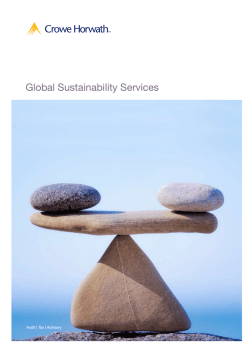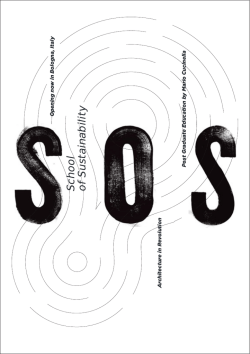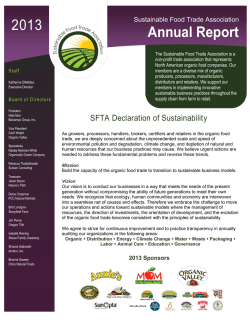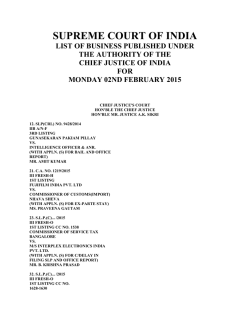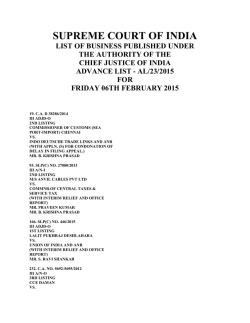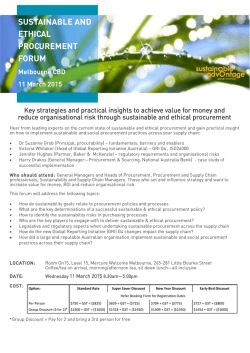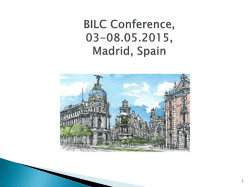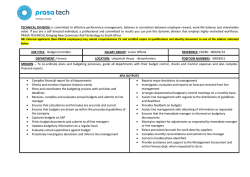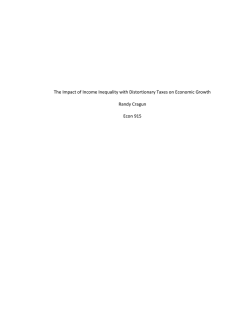
George Campus (Saasveld) - South African Forestry Contractors
George Campus (Saasveld) THE ROLE OF TERTIARY INSTITUTIONS TO EDUCATE MANAGERS ABOUT MODERNISATION AND ITS POWER TO INDUCE RAPID CHANGE IN THE FORESTRY INDUSTRY – Tiaan Pool EDUCATIONAL PHILOSOPHY Environment Business • Ecology • Natural Resource Management • Business Management • Environmental Management • Entrepreneurship • Certification • Resource Economics • Legislation • Integrated Social Development • Human Resource Management • Environmental Education • Communication / Negotiation • Health & Safety Social ROLE PLAYERS Public Sector (Government) Providers Skills Private Sector (Employer/ Producer) Training & Science Education Citizen (Employee) Reality GOVERNMENT • Originated to protect people from conflicts and to provide law and order. • Purpose to protect the people from threats within and without. • Hired by the people to guard (protecting life, liberty and property). • Directing and supervising public affairs PRIVATE SECTOR (EMPLOYER/PRODUCER) • A legal entity with the right to control the manner and means of services performed by workers under a contract. • Obliged to compensate. • A person, company, or country that makes, grows, or supplies goods or commodities for sale • Secret to their existence is sustainability. CITIZENS (EMPLOYEES) • A native or naturalized member of a state or nation, who is entitled to enjoy protection, legal rights and privileges granted by the government. • Owes allegiance to its government. • Obligated to obey its laws and fulfil duties as called upon. CITIZENS (EMPLOYEE) (Greg Ellis; 2014) TRAINING PROVIDERS • Training Centres/companies – Skills (Task orientated) – Training – Competencies – Short term needs (Reality) • Tertiary education institutions – Education (Science/Leadership orientated) – Research – Short term needs (Reality) – Long term needs (Sustainability) WORKFORCE AT RISK? Nobel Prize–winning economist Robert Shiller – “The 2nd Machine age” • Technology has make the pie bigger, leading to record wealth. • Unfortunately not everybody benefits from it. Some people, even a majority, may be worse off. • Since the Industrial Revolution, there was a rising tide that has helped most people, but in the past 15 - 20 years this trend has diverged. • Productivity continues to grow steeply and innovation is strong, but median income and employment have stagnated. • More wealth less jobs. More productivity les income. • World focus on either productivity or inequality. • Long term poor economic growth and sustainability. ADDRESSING THE ISSUE • Politicians don’t confront the issue – they pick issues that get them re-elected. • Discussion around inequality policies threatens the sense of identity people have through their role in society (Politicians, business men, privileged). • It is necessary to plan and enact legislation to deal with the inequalities produced by advanced technology if not, the rich are going to be taxed more - thus creating a precedent in future. • Livelihood insurance is an option…..(Dole) • If the bureaucracy don’t take action the private sector will have to. SO WHAT? • Modernisation is often the same as mechanisation = less jobs (Not compatible with policy of job creation and transfer of ownership of land) • Modernisation is close to functional training not catered for by NMMU (Large classes and time required) • Balance needed between science and functional/technical training. • Saasveld has to cater for both sides of coin and needs to be guided by the private sector (Academic board) • Saasveld focus on educating managers about modernised systems and should do research to make modernisation sustainable. EDUCATION/RESEARCH • Modernisation create challenges for, and opportunities for cooperation between all role players. • M Tech studies & B Tech projects • New land owners & contractors should attend industry induced higher education programmes & SLP’s. FOOD FOR THOUGHT SA is classified as a “developing country” because a big portion of the population is uneducated. Consider this: • Why do we buy buttons, tools, glue, clothes, food and toys - because we forgot how to make them? Is this not contributing to our “undeveloped” status? • Maybe we must start to identify and recognise our own strengths and use them to advance learning amongst our youth. • At the University we therefore not only deal with adult/adolescent learners, but mainly with an African instead of a Western culture. CURRENT DEVELOPPMENTS • Modernisation of 2016 curriculum. • Industry has played significant part in finalising the new curriculum via Advisory Board and workshops. • Increased depth in the qualification framework by introducing the Honours degree. (Including an applied research project). • HCVM 2014 • SLP’s - a flexible system which enables rapid response to specific needs. AND THE FUTURE? Balance, innovation, sustainability, indaba, awareness. Success seems to be connected with action. Successful leaders keep on moving. They make mistakes but they don’t quit
© Copyright 2026
